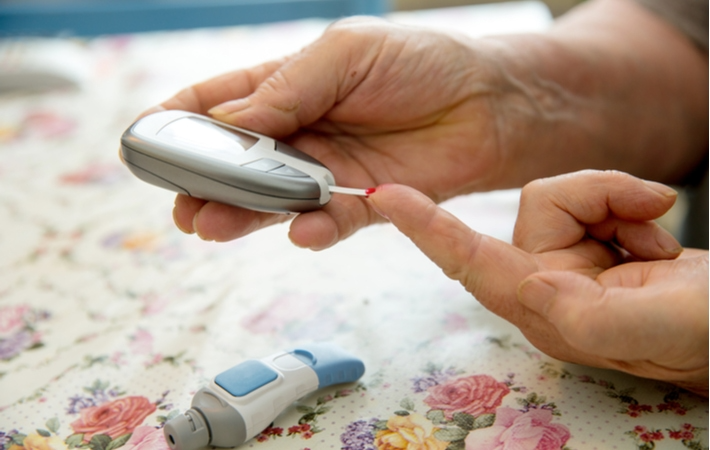Diabetes can be a difficult condition to manage, as can memory loss conditions like Alzheimer’s disease and other dementias. Understanding the link between diabetes and memory loss conditions is vital.
It’s essential to know how to reduce the risk of diabetes-related memory loss, and how memory care can help people with Alzheimer’s and other dementias. This information leaves you better prepared when the time comes to consider specialized care.
Diabetes Explained
Diabetes affects the way a person’s body uses and produces insulin. Insulin is a hormone that provides energy in the form of blood glucose to the body’s cells. The body’s muscles and organs rely on glucose to function properly. Blood glucose also acts as the brain’s primary source of fuel.
Diabetes is typically understood in 2 different categories: type 1 and type 2 diabetes. Type 1 diabetes is a genetic condition, and symptoms are generally noticeable in childhood. People with type 1 diabetes don’t produce insulin at all.
Type 2 diabetes is related to a person’s lifestyle and can develop slowly over time. People with type 2 diabetes don’t use insulin well, and as the disease progresses are less able to produce insulin and may become unable to make it on their own.
Diabetes can be managed by:
- Increasing physical activity
- Adjusting eating habits
- Taking insulin shots
- Avoiding artificial sugars
- Monitoring blood sugar
By diligently managing their condition under the supervision of medical professionals, people with diabetes can live fulfilling lives uninterrupted by complications. However, when diabetes isn’t managed correctly, it can increase the risk of medical conditions such as memory loss.

How are Diabetes and Memory Loss Linked?
Type 2 diabetes is associated with an increased risk of developing memory loss conditions such as Alzheimer’s disease and other dementias. Higher blood glucose levels damage the essential nerve cells that feed the brain.
In particular, diabetes is linked to a higher risk of vascular dementia. Vascular dementia is a type of dementia caused by damaged blood vessels. The link between blood glucose levels and the fact that diabetes affects the size and ability of blood vessels to power the brain increases the likelihood of a person with diabetes developing dementia.
Studies have also shown insulin resistance in people with Alzheimer’s, linking diabetes with an increased risk of Alzheimer’s. If the brain resists insulin, it can’t receive the vital power from blood glucose it needs to function correctly and remain healthy.
By properly managing diabetes, a person can reduce their risk of developing memory loss conditions or, at the least, delay their early development.
Reducing the Risk of Memory Loss
Memory loss is primarily linked to people with unmanaged type 2 diabetes. Correctly managing the condition is the best way to reduce cognitive decline and maintain healthier brain function for longer.
Control Blood Glucose Levels
Memory decline is linked to people with higher than normal levels of HbA1c, which is a form of hemoglobin linked to sugar. Similarly, low blood glucose levels can increase a person’s risk of Alzheimer’s or dementia. Tracking blood glucose levels through an A1C test helps properly manage the condition.
Eat Nutritious Food
A healthy diet filled with whole foods including fresh fruits and vegetables, healthy meats, and whole grains helps manage weight and fat levels, which are closely linked to those who have type 2 diabetes. Foods high in omega-3 fatty acids have been shown to help older adults maintain cognitive function. Some examples of omega-3 rich foods include:
- Salmon
- Herring
- Mackerel
- Chia seeds
- Walnuts
People can also purchase omega-3 fish oil supplements if they don’t have enough omega-3 in their current diet.
Exercise Regularly
Regular exercise can improve blood glucose levels in people with type 2 diabetes. The National Institutes of Health recommends 150 minutes of exercise per week. Exercise doesn’t need to be overly strenuous; a person with type 2 diabetes can get all the exercise they need through walking, swimming, yoga, or even dancing.
Access Quality Memory Care
Memory care is a specific form of senior living where residents with Alzheimer’s disease, dementias, and other memory loss conditions can receive the care they require to live fulfilling lives. Specialized staff and programming provide a welcoming and secure environment.
If a person in your life has a memory loss condition caused by diabetes, our staff at The Villages at Murfreesboro are ready to welcome them and provide them with the care they need. Get in touch with us to learn more.




